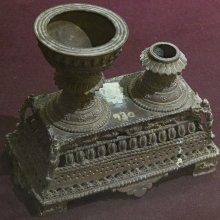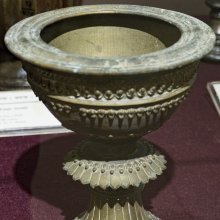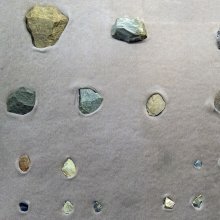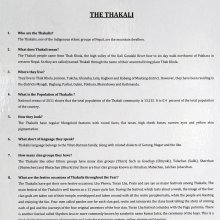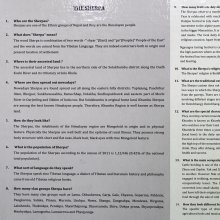Khola, Khōla: 13 definitions
Introduction:
Khola means something in Hinduism, Sanskrit, the history of ancient India, Marathi, Hindi, biology. If you want to know the exact meaning, history, etymology or English translation of this term then check out the descriptions on this page. Add your comment or reference to a book if you want to contribute to this summary article.
Images (photo gallery)
India history and geography
Source: Cologne Digital Sanskrit Dictionaries: Indian Epigraphical GlossaryKhola.—(IE 8-3); HD), an official designation of uncertain meaning (Ep. Ind., Vol. IV, pp. 250, 253); probably a kind of messenger. Utpala on the Bṛhatsaṃhitā, 85. 34, explains Dūta as Gamāgamika while some Pāla inscriptions place Khola between the two; probably the same as Preṣaṇika or Dūta- preṣaṇika, a dispatcher of messengers. Note: khola is defined in the “Indian epigraphical glossary” as it can be found on ancient inscriptions commonly written in Sanskrit, Prakrit or Dravidian languages.

The history of India traces the identification of countries, villages, towns and other regions of India, as well as mythology, zoology, royal dynasties, rulers, tribes, local festivities and traditions and regional languages. Ancient India enjoyed religious freedom and encourages the path of Dharma, a concept common to Buddhism, Hinduism, and Jainism.
Biology (plants and animals)
Source: Google Books: CRC World Dictionary (Regional names)Khola in India is the name of a plant defined with Benincasa hispida in various botanical sources. This page contains potential references in Ayurveda, modern medicine, and other folk traditions or local practices It has the synonym Benincasa hispida Cogn. (among others).
Example references for further research on medicinal uses or toxicity (see latin names for full list):
· Systema Vegetabilium, ed. 14 (1784)
· Journal of Ethnopharmacology (2001)
· Journal of Ethnopharmacology (2005)
· Monographiae Phanerogamarum (1881)
· Nova Acta Regiae Soc. Sci. Upsal. (1783)
· Flora Japonica (1784)
If you are looking for specific details regarding Khola, for example diet and recipes, pregnancy safety, health benefits, side effects, extract dosage, chemical composition, have a look at these references.

This sections includes definitions from the five kingdoms of living things: Animals, Plants, Fungi, Protists and Monera. It will include both the official binomial nomenclature (scientific names usually in Latin) as well as regional spellings and variants.
Languages of India and abroad
Marathi-English dictionary
Source: DDSA: The Molesworth Marathi and English Dictionarykhōla (खोल).—a Deep. 2 fig. Close, secret, reserved: also wise, sagacious, learned, full: also not superficial, not obvious, recondite, occult, abstruse. 3 (Used with nouns signifying declivity or descent.) Steep.
--- OR ---
khōlā (खोला) [or ल्या, lyā].—m An untrimmed and unfashioned drōṇa or ghee-boat, made up of a single leaf with one stitch: also a rude patrāvaḷa or ill-tacked platter of leaves. Used by the mādhukarī to receive their gettings by begging; as a vehicle for the boiling of rice-dough, pulse-flour &c. 2 An open-mouthed jar of a semispherical bottom. It is used as a flowerpot, and is smaller than kōḷambēṃ.
--- OR ---
khōḷa (खोळ).—f m A case to be stuffed (as of a mattress, pillow, quilt, aṅgarakhā). 2 A hooded cloak (formed of the shoulder-cloth, of a kāmbaḷā &c.) for defence from rain. 3 A hooded cloak for children. 4 The membrane in which the fœtus is enveloped; secundines or after-birth.
--- OR ---
khōḷā (खोळा).—m Commonly khōḷa q. v. in Sig. I. II. III.
Source: DDSA: The Aryabhusan school dictionary, Marathi-Englishkhōla (खोल).—a Deep. Secret. Wise. Not obvious. Steep.
--- OR ---
khōlā (खोला).—m A rude leaf-vessel.
--- OR ---
khōḷa (खोळ).—f m-ḷā m A case to be stuffed. A hooded cloak. A membrane on the fœtus.
Marathi is an Indo-European language having over 70 million native speakers people in (predominantly) Maharashtra India. Marathi, like many other Indo-Aryan languages, evolved from early forms of Prakrit, which itself is a subset of Sanskrit, one of the most ancient languages of the world.
Sanskrit dictionary
Source: DDSA: The practical Sanskrit-English dictionaryKhola (खोल).—a. Limping, lame.
See also (synonyms): khora.
--- OR ---
Khola (खोल).—a. Lame.
-lam Helmet.
Derivable forms: kholaḥ (खोलः).
Source: Cologne Digital Sanskrit Dictionaries: Edgerton Buddhist Hybrid Sanskrit DictionaryKholā (खोला).—(?) (Sanskrit khola, m. or nt.), some sort of head-covering, hat or cap, or perhaps helmet (Tibetan zhva, any kind of headcovering): Mahāvyutpatti 8612 na kholā-śirase (but Mironov khola°) dharmaṃ deśayiṣyāmi.
Source: Cologne Digital Sanskrit Dictionaries: Shabda-Sagara Sanskrit-English DictionaryKhola (खोल).—mfn.
(-laḥ-lā-laṃ) Lame. E. khol to be lame, affix ac; also khora, &c.
Source: Cologne Digital Sanskrit Dictionaries: Monier-Williams Sanskrit-English Dictionary1) Khola (खोल):—[from khol] mfn. (cf. χωλός) limping, lame, [cf. Lexicographers, esp. such as amarasiṃha, halāyudha, hemacandra, etc.]
2) [v.s. ...] m. n. a helmet or a kind of hat, [Kādambarī v, 1082; Harṣacarita vii]
3) [v.s. ...] m. cf. mūrdha-kh.
Source: Cologne Digital Sanskrit Dictionaries: Yates Sanskrit-English Dictionary1) Khola (खोल):—(ṛ) kholati 1. a. To be lame.
2) [(laḥ-lā-laṃ) a.] Lame.
[Sanskrit to German]
Sanskrit, also spelled संस्कृतम् (saṃskṛtam), is an ancient language of India commonly seen as the grandmother of the Indo-European language family (even English!). Closely allied with Prakrit and Pali, Sanskrit is more exhaustive in both grammar and terms and has the most extensive collection of literature in the world, greatly surpassing its sister-languages Greek and Latin.
Hindi dictionary
Source: DDSA: A practical Hindi-English dictionaryKhola (खोल) [Also spelled khol]:—(nm) a cover; sheath; shell (casting); holster.
...
Kannada-English dictionary
Source: Alar: Kannada-English corpusKhōla (ಖೋಲ):—[noun] = ಖೋಡ [khoda].
Kannada is a Dravidian language (as opposed to the Indo-European language family) mainly spoken in the southwestern region of India.
See also (Relevant definitions)
Starts with (+12): Khola ruis, Khola-bosiu, Kholabandi, Kholabanem, Kholabuddhi, Kholaen, Kholaga, Kholagadhanem, Kholai, Kholaka, Kholakara, Kholakashirsha, Kholakata, Kholakhala, Kholakkhiya, Kholalata, Kholamba, Kholambanem, Kholambavinem, Kholambisu.
Ends with: Adakhola, Akkhola, Bavakhola, Cakhola, Deo-jokhola, Lakhola, Murddhakhola, Murdhakhola, Pemkhola, Pimkhola, Prenkhola, Rakhola, Ram jakhola, Ramkhola, Ran jakhola, Rinkhola, Sakhola, Vakhola.
Full-text (+16): Kholashiras, Khora, Murddhakhola, Murdhakhola, Khola ruis, Khola-bosiu, Kholi, Kholava, Khori, Kholakata, Kholavata, Kholaga, Murttakolam, Kholavinem, Khol, Kholabuddhi, Kholanem, Khundi, Sakhola, Kusumasava.
Relevant text
Search found 7 books and stories containing Khola, Khōla, Khōlā, Kholā, Khōḷa, Khōḷā, Kholaa; (plurals include: Kholas, Khōlas, Khōlās, Kholās, Khōḷas, Khōḷās, Kholaas). You can also click to the full overview containing English textual excerpts. Below are direct links for the most relevant articles:
Chaitanya Bhagavata (by Bhumipati Dāsa)
Verse 2.9.140 < [Chapter 9 - The Lord’s Twenty-One Hour Ecstasy and Descriptions of Śrīdhara and Other Devotees’ Characteristics]
Verse 2.9.186 < [Chapter 9 - The Lord’s Twenty-One Hour Ecstasy and Descriptions of Śrīdhara and Other Devotees’ Characteristics]
Verse 3.4.463 < [Chapter 4 - Descriptions of Śrī Acyutānanda’s Pastimes and the Worship of Śrī Mādhavendra]
Harshacharita (socio-cultural Study) (by Mrs. Nandita Sarmah)
Part 9.5: Dress and Other Amenities of a Soldier < [Chapter 5 - Political Aspects]
Jnaneshwari (Bhavartha Dipika) (by Ramchandra Keshav Bhagwat)
Verse 8.5 < [Chapter 8 - Akshara-brahman-yoga]
Puppetry in Assam (by Gitali Saikia)
Folk Theatre (e): Bharigan < [Chapter 6]
Folk Theatre (a): Kamrupia Dhulia < [Chapter 6]
Folk Theatre (c): Khulia Bhaona < [Chapter 6]
Srila Gurudeva (The Supreme Treasure) (by Swami Bhaktivedanta Madhava Maharaja)
First Letter < [Chapter 2.9 - Letters From America]
Folk Tradition of Bengal (and Rabindranath Tagore) (by Joydeep Mukherjee)
